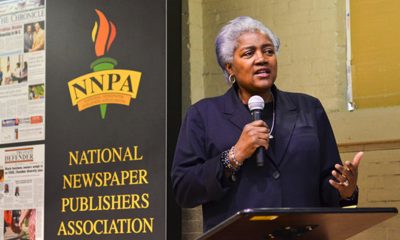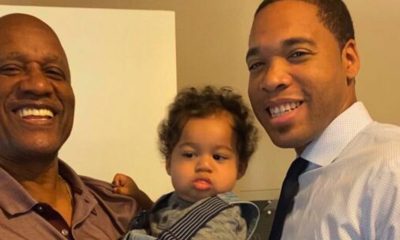Business
Why McDonald’s is Still a Powerhouse, Despite Troubles

This Thursday, Jan. 15, 2015, file photo, shows a McDonald’s fast food restaurant sign in Chicago. McDonalds has been hurt by diners who want something different. Sales have been struggling for more than two years and the company seems trapped in a cycle of bad headlines that likely wont end soon. Despite troubles, McDonalds is still a powerhouse. (AP Photo/Nam Y. Huh, File)
CANDICE CHOI, AP Food Industry Writer
NEW YORK (AP) — McDonald’s sales have been sputtering for more than two years and the company seems trapped in a cycle of bad headlines that likely won’t end soon.
Its quarterly earnings results on Wednesday aren’t expected to be pretty either, and there’s a chance its dominance will continue to wane as newer players keep coming onto the scene.
But don’t write the obituary just yet. McDonald’s has many strengths that the rivals biting at its heels can only envy, including Ronald McDonald’s worldwide recognition. The Golden Arches will need to put them to good use to remain the world’s largest restaurant chain.
Here are six reasons why McDonald’s is nowhere close to death’s door for now.
___
MASSIVE REACH
McDonald’s has more than 14,300 locations in the U.S. and that ubiquity continues to make it a default option for many. Burrito chain Chipotle is in growth mode but still only a fraction of that size, with around 1,800 locations. (Shake Shack, whose stock offering earlier this year garnered lots of attention, has fewer than 40.)
Because of its recent struggles, McDonald’s plans to slow its growth to its lowest level in five years. But “slow” is relative: It still plans to add 600 to 700 restaurants around the world this year, on top of the more than 36,200 it already has.
Chipotle said it plans to open up to 205 new stores this year, mostly in the U.S.
___
MARKETING POWER
McDonald’s has enormous marketing muscle, in large part because its franchisees are required to contribute at least 4 percent of their sales to advertising.
Based on the $31.1 billion in sales U.S. franchisees saw last year, that would translate to at least $1.24 billion in advertising money.
That huge bucket of money is split in two ways. Some goes to national advertising and focuses on burnishing the brand. The rest goes to regional advertising and focuses more on promotions to drive customers to stores.
Advertising doesn’t have to be expensive to be effective, of course. But McDonald’s deep pockets give it a clear advantage.
___
PRINTING MONEY
The recent sales decline in the U.S. is squeezing franchisees, who still have to pay for fixed costs like labor and electricity.
But McDonald’s restaurants continue to generate a lot more cash than their peers. In 2014, the average McDonald’s restaurant raked in $2.5 million in sales, according to industry tracker Technomic. Wendy’s restaurants pulled in an average of $1.6 million, while Burger King pulled in $1.2 million.
A big reason for the difference: the popularity of McDonald’s breakfast.
Average annual sales for Shake Shack are higher at $4.6 million, Technomic said. That’s in part because Shake Shack is concentrated in New York City, where volumes tend to be higher. The average Chipotle generates roughly the same sales volume as McDonald’s even without breakfast, in part because of its fast-moving line and higher prices.
___
UNLOCKING BREAKFAST
Fans of McDonald’s breakfast have long called on the chain to offer it past 10:30 a.m. McDonald’s is finally giving the idea a serious try with a test of an all-day breakfast menu in San Diego.
It’s just one way McDonald’s might bring more customers into its stores and may signal the company’s willingness to take bigger risks.
Big companies tend to be cautious about change, and McDonald’s in particular is known for its methodical decision-making. But executives may pick up the pace to avoid becoming outdated.
___
NEW LEADERSHIP
McDonald’s CEO Steve Easterbrook stepped into his role just last month and said he wants to make McDonald’s a “modern, progressive burger company.” In a meet-and-greet with analysts, he also referred to himself as an “internal activist,” according to Sara Senatore, a Bernstein analyst.
Another new executive is Mike Andres, who became president of the U.S. division in October. He started as a manager for his family-owned McDonald’s, and has served in a variety of leadership roles at the company.
(Side note: Andres’ father was a pilot for Ray Kroc, who built McDonald’s into a fast-food giant.)
___
MCDONALD’S HAS BEEN HERE BEFORE
The troubles McDonald’s is facing are partly the result of a shifting industry, with many smaller players posing a challenge to the big guys. If that trend keeps up, McDonald’s may not be able to save itself.
At the same time, it’s easy to forget that McDonald’s has had rough patches before — and pulled out of them.
Consider the expanded menu and focus on value that former CEO Jim Skinner used to turn around business. It isn’t an ancient example; Skinner’s tenure was from 2004 to 2012, the last few years of which were some of McDonald’s strongest.
____
Follow Candice Choi at www.twitter.com/candicechoi
Copyright 2015 The Associated Press. All rights reserved. This material may not be published, broadcast, rewritten or redistributed.
Bay Area
State Controller Malia Cohen Keynote Speaker at S.F. Wealth Conference
California State Controller Malia Cohen delivered the keynote speech to over 50 business women at the Black Wealth Brunch held on March 28 at the War Memorial and Performing Arts Center at 301 Van Ness Ave. in San Francisco. The Enterprising Women Networking SF Chapter of the American Business Women’s Association (ABWA) hosted the Green Room event to launch its platform designed to close the racial wealth gap in Black and Brown communities.

By Carla Thomas
California State Controller Malia Cohen delivered the keynote speech to over 50 business women at the Black Wealth Brunch held on March 28 at the War Memorial and Performing Arts Center at 301 Van Ness Ave. in San Francisco.
The Enterprising Women Networking SF Chapter of the American Business Women’s Association (ABWA) hosted the Green Room event to launch its platform designed to close the racial wealth gap in Black and Brown communities.
“Our goal is to educate Black and Brown families in the masses about financial wellness, wealth building, and how to protect and preserve wealth,” said ABWA San Francisco Chapter President LaRonda Smith.
ABWA’s mission is to bring together businesswomen of diverse occupations and provide opportunities for them to help themselves and others grow personally and professionally through leadership, education, networking support, and national recognition.
“This day is about recognizing influential women, hearing from an accomplished woman as our keynote speaker and allowing women to come together as powerful people,” said ABWA SF Chapter Vice President Velma Landers.
More than 60 attendees dined on the culinary delights of Chef Sharon Lee of The Spot catering, which included a full soul food brunch of skewered shrimp, chicken, blackened salmon, and mac and cheese.
Cohen discussed the many economic disparities women and people of color face. From pay equity to financial literacy, Cohen shared not only statistics, but was excited about a new solution in motion which entailed partnering with Californians for Financial Education.
“I want everyone to reach their full potential,” she said. “Just a few weeks ago in Sacramento, I partnered with an organization, Californians for Financial Education.
“We gathered 990 signatures and submitted it to the [California] Secretary of State to get an initiative on the ballot that guarantees personal finance courses for every public school kid in the state of California.
“Every California student deserves an equal opportunity to learn about filing taxes, interest rates, budgets, and understanding the impact of credit scores. The way we begin to do that is to teach it,” Cohen said.
By equipping students with information, Cohen hopes to close the financial wealth gap, and give everyone an opportunity to reach their full financial potential. “They have to first be equipped with the information and education is the key. Then all we need are opportunities to step into spaces and places of power.”
Cohen went on to share that in her own upbringing, she was not guided on financial principles that could jump start her finances. “Communities of color don’t have the same information and I don’t know about you, but I did not grow up listening to my parents discussing their assets, their investments, and diversifying their portfolio. This is the kind of nomenclature and language we are trying to introduce to our future generations so we can pivot from a life of poverty so we can pivot away and never return to poverty.”
Cohen urged audience members to pass the initiative on the November 2024 ballot.
“When we come together as women, uplift women, and support women, we all win. By networking and learning together, we can continue to build generational wealth,” said Landers. “Passing a powerful initiative will ensure the next generation of California students will be empowered to make more informed financial decisions, decisions that will last them a lifetime.”
Business
Black Business Summit Focuses on Equity, Access and Data
The California African American Chamber of Commerce hosted its second annual “State of the California African American Economy Summit,” with the aim of bolstering Black economic influence through education and fellowship. Held Jan. 24 to Jan. 25 at the Westin Los Angeles Airport Hotel, the convention brought together some of the most influential Black business leaders, policy makers and economic thinkers in the state. The discussions focused on a wide range of economic topics pertinent to California’s African American business community, including policy, government contracts, and equity, and more.

By Solomon O. Smith, California Black Media
The California African American Chamber of Commerce hosted its second annual “State of the California African American Economy Summit,” with the aim of bolstering Black economic influence through education and fellowship.
Held Jan. 24 to Jan. 25 at the Westin Los Angeles Airport Hotel, the convention brought together some of the most influential Black business leaders, policy makers and economic thinkers in the state. The discussions focused on a wide range of economic topics pertinent to California’s African American business community, including policy, government contracts, and equity, and more.
Toks Omishakin, Secretary of the California State Transportation Agency (CALSTA) was a guest at the event. He told attendees about his department’s efforts to increase access for Black business owners.
“One thing I’m taking away from this for sure is we’re going to have to do a better job of connecting through your chambers of all these opportunities of billions of dollars that are coming down the pike. I’m honestly disappointed that people don’t know, so we’ll do better,” said Omishakin.
Lueathel Seawood, the president of the African American Chamber of Commerce of San Joaquin County, expressed frustration with obtaining federal contracts for small businesses, and completing the process. She observed that once a small business was certified as DBE, a Disadvantaged Business Enterprises, there was little help getting to the next step.
Omishakin admitted there is more work to be done to help them complete the process and include them in upcoming projects. However, the high-speed rail system expansion by the California High-Speed Rail Authority has set a goal of 30% participation from small businesses — only 10 percent is set aside for DBE.
The importance of Diversity, Equity and Inclusion (DEI) in economics was reinforced during the “State of the California Economy” talk led by author and economist Julianne Malveaux, and Anthony Asadullah Samad, Executive Director of the Mervyn Dymally African American Political and Economic Institute (MDAAPEI) at California State University, Dominguez Hills.
Assaults on DEI disproportionately affect women of color and Black women, according to Malveaux. When asked what role the loss of DEI might serve in economics, she suggested a more sinister purpose.
“The genesis of all this is anti-blackness. So, your question about how this fits into the economy is economic exclusion, that essentially has been promoted as public policy,” said Malveaux.
The most anticipated speaker at the event was Janice Bryant Howroyd known affectionately to her peers as “JBH.” She is one of the first Black women to run and own a multi-billion-dollar company. Her company ActOne Group, is one of the largest, and most recognized, hiring, staffing and human resources firms in the world. She is the author of “Acting Up” and has a profile on Forbes.
Chairman of the board of directors of the California African American Chamber of Commerce, Timothy Alan Simon, a lawyer and the first Black Appointments Secretary in the Office of the Governor of California, moderated. They discussed the state of Black entrepreneurship in the country and Howroyd gave advice to other business owners.
“We look to inspire and educate,” said Howroyd. “Inspiration is great but when I’ve got people’s attention, I want to teach them something.”
Activism
Oakland Post: Week of April 17 – 23, 2024
The printed Weekly Edition of the Oakland Post: Week of April 17 – 23, 2024

To enlarge your view of this issue, use the slider, magnifying glass icon or full page icon in the lower right corner of the browser window. ![]()
-

 Activism4 weeks ago
Activism4 weeks agoOakland Post: Week of March 27 – April 2, 2024
-

 #NNPA BlackPress4 weeks ago
#NNPA BlackPress4 weeks agoFrom Raids to Revelations: The Dark Turn in Sean ‘Diddy’ Combs’ Saga
-

 #NNPA BlackPress4 weeks ago
#NNPA BlackPress4 weeks agoCOMMENTARY: D.C. Crime Bill Fails to Address Root Causes of Violence and Incarceration
-

 #NNPA BlackPress4 weeks ago
#NNPA BlackPress4 weeks agoCOMMENTARY: Lady Day and The Lights!
-

 #NNPA BlackPress4 weeks ago
#NNPA BlackPress4 weeks agoMayor, City Council President React to May 31 Closing of Birmingham-Southern College
-

 #NNPA BlackPress4 weeks ago
#NNPA BlackPress4 weeks agoBaltimore Key Bridge Catastrophe: A City’s Heartbreak and a Nation’s Alarm
-

 #NNPA BlackPress4 weeks ago
#NNPA BlackPress4 weeks agoBaltimore’s Key Bridge Struck by Ship, Collapses into Water
-

 #NNPA BlackPress4 weeks ago
#NNPA BlackPress4 weeks agoBeloved Actor and Activist Louis Cameron Gossett Jr. Dies at 87





















































